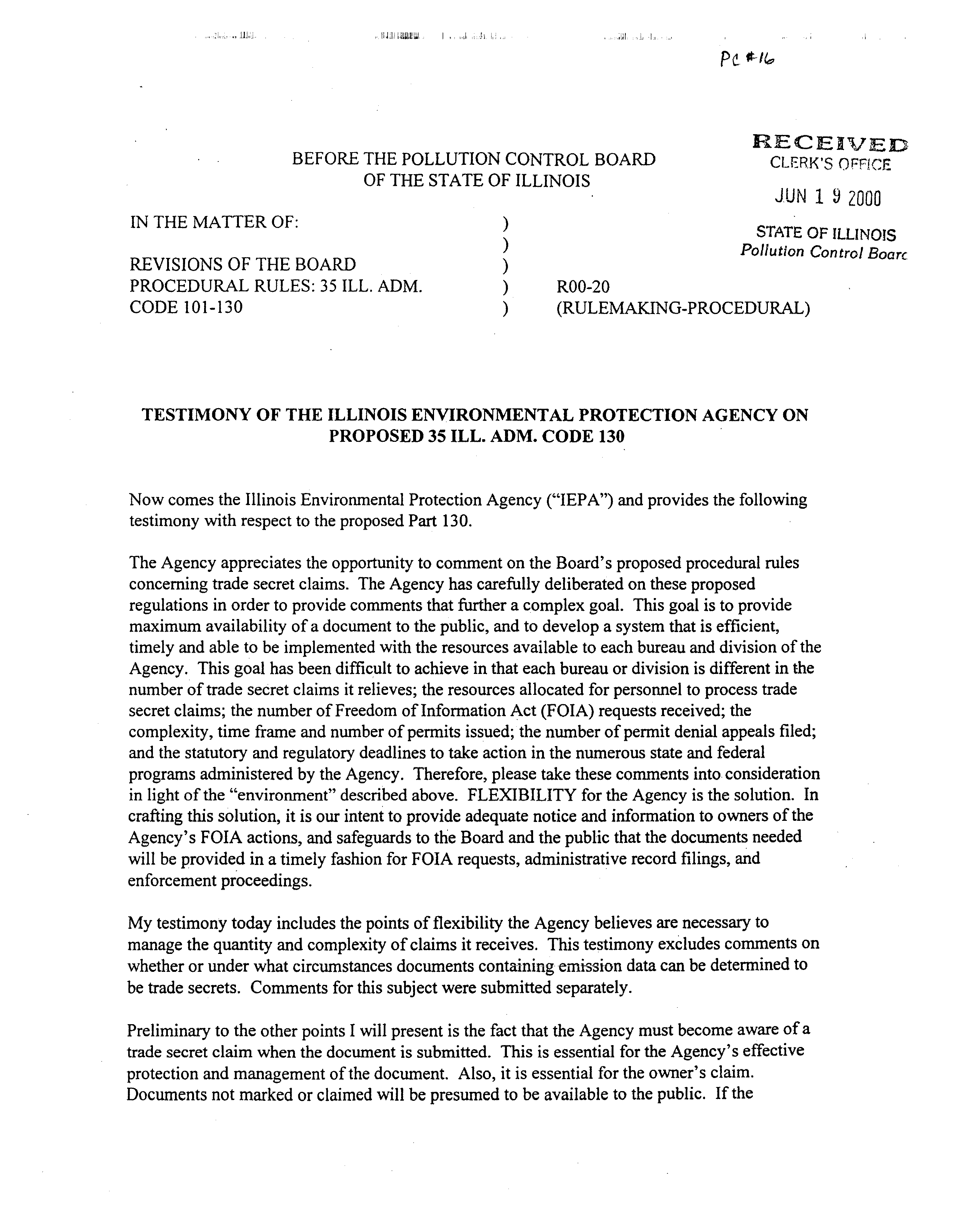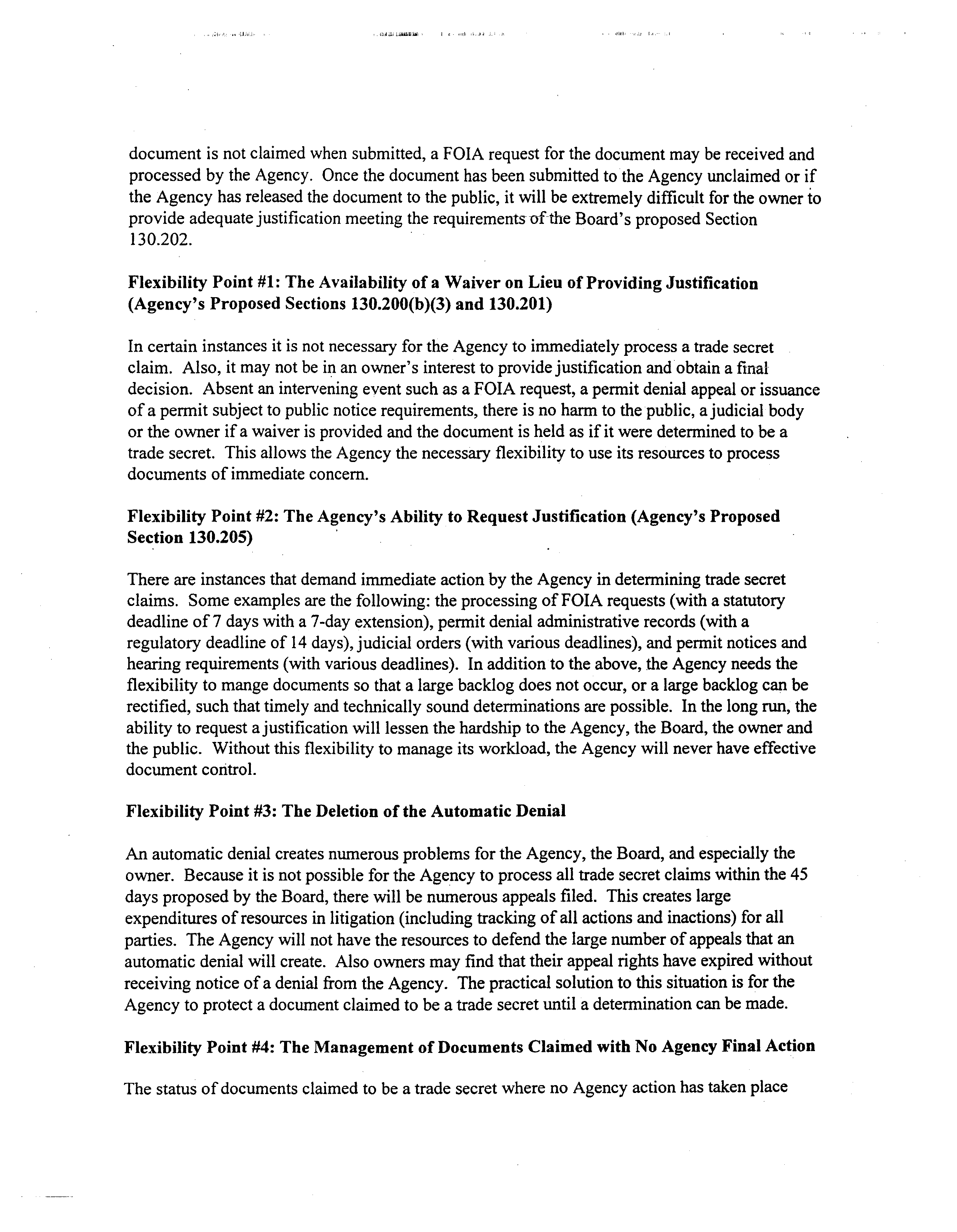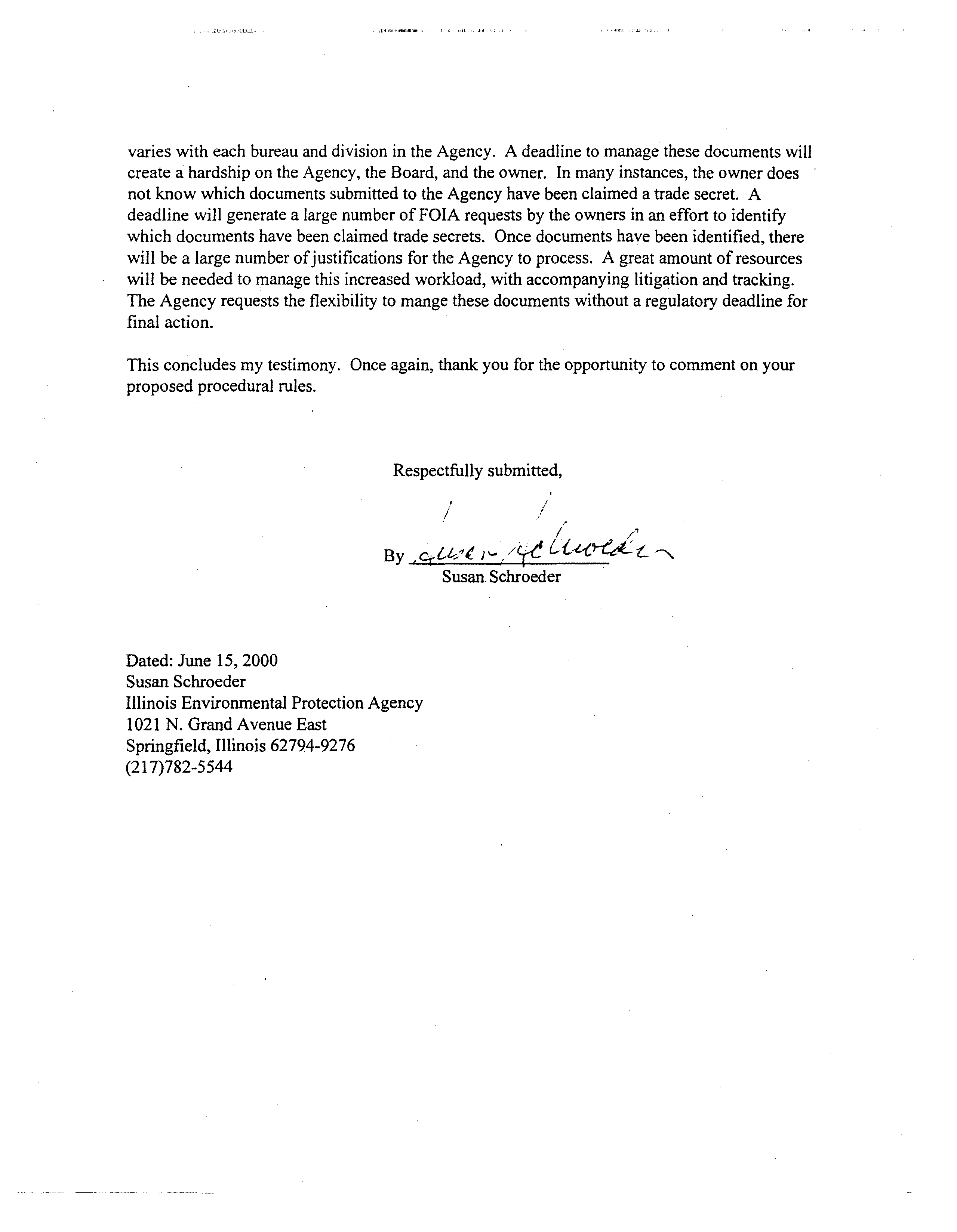RECEIvED
BEFORE THE POLLUTION CONTROL BOARD
CLERK’S
OFFiCE
OF THE STATE OF ILLINOIS
JUN
1
~ Z000
IN
THE MATTER OF:
)
STATE OF
ILLINOIS
)
Pollution Control Boarr
REVISIONS OF THE BOARD
)
PROCEDURAL RULES:
35
ILL. ADM.
)
R00-20
CODE 101-130
)
(RULEMAKING-PROCEDURAL)
TESTIMONY OF THE ILLINOIS ENVIRONMENTAL PROTECTION AGENCY ON
PROPOSED 35 ILL. ADM. CODE
130
Now comes the Illinois Environmental Protection Agency (“IEPA”) and provides the following
testimony with respect to the proposed Part 130.
The Agency appreciates the opportunity to comment on the Board’s proposed procedural rules
concerning trade secret claims.
The Agency has carefully deliberated on these proposed
regulations in order to provide comments that further a complex goal.
This goal is to provide
maximum availability
ofa document to the public, and to develop a system that
is efficient,
timely and able to be implemented with the resources available to each bureau and division ofthe
Agency.
This goal has been difficult to achieve in that each bureau or division is different in the
number oftrade secret claims it relieves; the resources
allocated for personnel to process trade
secret claims; the number ofFreedom ofInformation Act (FOIA) requests received; the
complexity, time frame and number ofpermits
issued; the number ofpermit denial appeals filed;
and the statutory and regulatory deadlines to take action in the numerous state and federal
programs administered by the Agency.
Therefore, please take these comments into consideration
in light of the “environment” described above.
FLEXIBILITY for the Agency is the solution.
In
crafting this solution, it is our intent to provide adequate notice and information to owners ofthe
Agency’s FOIA actions, and safeguards to the Board and the public that the documents needed
will be provided in a timely fashion for FOIA requests, administrative record filings, and
enforcement proceedings.
My testimony today includes the points offlexibility the Agency believes are necessary to
manage the quantity and complexity ofclaims it receives.
This testimony excludes comments on
whether or under what circumstances documents containing emission data can be determined to
be trade secrets.
Comments for this subject were submitted separately.
Preliminary to the other points I will present is the fact that the Agency must become aware ofa
trade secret claim when the document is submitted.
This is essential forthe Agency’s effective
protection and management ofthedocument.
Also, it is essential for the owner’s claim.
Documents not marked or claimed will be presumed to be available to the public.
If the
document is not claimed when submitted,
a FOIA request for the document may be received and
processed by the Agency.
Once the document has been submitted to the Agency unclaimed or if
the Agency has released the document to the public, it will be extremely difficult forthe owner to
provide adequate justification meeting the requirements-of the Board’s proposed Section
130.202.
Flexibility
Point #1: The Availability of a Waiver on Lieu ofProviding Justification
(Agency’s Proposed Sections
130.200(b)(3) and 130.201)
In
certain instances
it is not
necessary
for the Agency to immediately process a trade secret
claim.
Also, it may not be in an owner’s interest to provide justification and obtain a final-
decision.
Absent an intervening event such as a FOIA request, a permit denial appeal or issuance
ofa permit subject to public notice requirements, there is no harm to the public, ajudicial body
or the owner if a waiver is provided and the document is held as if it were determined to be a
trade secret.
This allows the Agency the necessary flexibility to use its resources to process
documents ofimmediate concern.
Flexibility Point #2: The Agency’s Ability to Request Justification (Agency’s Proposed
Section
130.205)
There are instances that demand immediate action by the Agency in determining trade secret
claims.
Some examples are the following: the processing ofFOIA requests (with a statutory
deadline of 7 days with a 7-day extension), permit denial administrative records (with a
regulatory deadline of 14 days), judicial orders (with various deadlines), and permit notices and
hearing requirements (with various deadlines).
In addition to the above, the Agency needs the
flexibility to mange documents so
that a large backlog does not occur, or a large backlog can be
rectified, such that timely and technically sound determinations are possible.
In the long run, the
ability to request ajustification will lessen the hardship to the Agency, the Board, the owner and
the public.
Without this flexibility to manage its workload, the Agency will never have effective
document control.
Flexibility Point
#3: The Deletion of the Automatic Denial
An automatic denial creates numerous problems forthe Agency, the Board, and especially the
owner.
Because it is not possible forthe Agency to process all trade secret claims within the
45
days proposed by the Board, there will be numerous appeals filed.
This creates large
expenditures of resources in litigation (including tracking ofall actions and inactions) for all
parties.
The Agency will not have the resources to defend the large number ofappeals that an
automatic denial will create.
Also owners may find that their appeal rights have expired without
receiving notice ofa denial from the Agency.
The practical solution to this situation is for the
Agency to protect a document claimed to
be a trade secret until a determination can be made.
Flexibility Point #4:
The Management of Documents Claimed with No Agency Final Action
The status ofdocuments claimed to be a trade secret where no Agency action has taken place
varies with each bureau and division in the Agency.
A deadline to manage these documents will
create a hardship on the Agency, the Board,
and the owner.
In many instances,
the owner does
not know which documents submitted to the Agency have been claimed a trade secret.
A
deadline will generate a large number of FOIA requests
by the owners in an effort to identif~’
which documents have been claimed trade secrets.
Once documents have been identified, there
will be a large number ofjustifications for the Agency to process.
A great amount ofresources
will be needed to
manage this increased workload, with accompanying litigation and tracking.
The Agency requests the flexibility to mange these documents without a regulatory deadline for
final action.
This concludes my testimony.
Once again, thank you for the opportunity to comment on your
proposed procedural rules.
Respectfully submitted,
/
~1
/
/1
By
,c~t4~
~
Susan. Schroeder
Dated: June
15,
2000
Susan Schroeder
Illinois Environmental Protection Agency
1021 N.
Grand Avenue East
Springfield, Illinois 62794-9276
(217)782-5544



